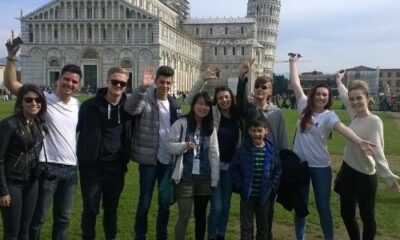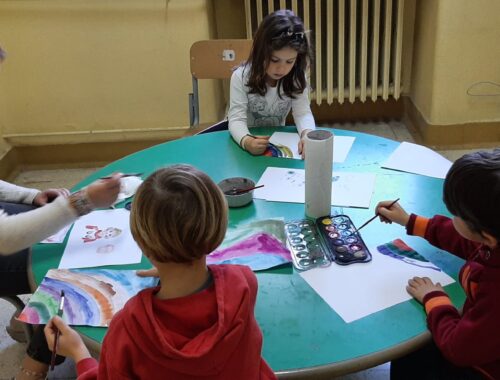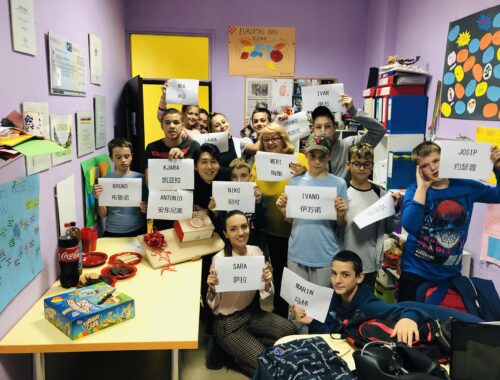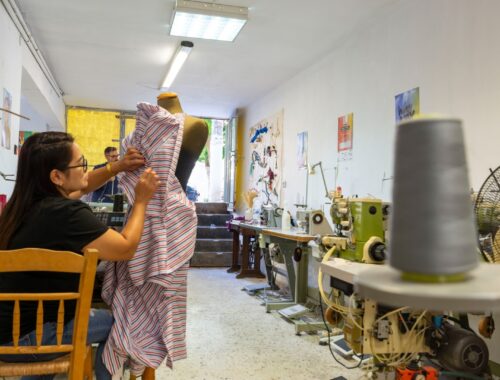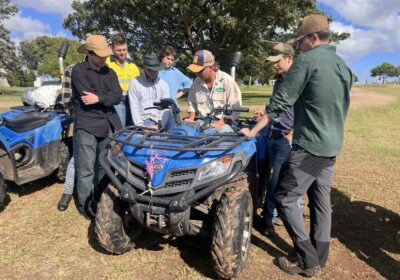Support inclusive education in Rome by volunteering with local organisations that offer after-school learning, language support, and community programmes. As an Oyster volunteer, you’ll teach English, help plan creative lessons, and engage children, migrants, and elderly learners in meaningful, culturally enriching ways. Gain experience in grassroots education while making a positive social impact in Italy’s capital.
Duration: 2 – 12 weeks
Dates: Click here for availability calendar
Arrival day: Sunday
Return day: Saturday
Age: 18+
Share with friends...
Highlights
- Inclusive Language Teaching: Support children, migrants, and elderly learners through engaging English lessons tailored to their needs and interests.
Empower Through Education: Help break down barriers by teaching useful vocabulary, leading creative activities, and building confidence in communication.
Work with Local Non-Profits: Join dedicated community organisations offering after-school support and informal learning environments across Rome.
Create Lasting Connections: Use games, songs, stories, and conversation to inspire learning and cultural exchange across generations.
Experience Rome with Purpose: Stay in central accommodation, enjoy Italian cuisine, and explore the city while giving back through impactful volunteer work
Access to quality education in Italy is uneven, especially for children from migrant backgrounds, low-income families, or communities affected by social exclusion. Many schools lack consistent, high-quality English instruction, and this gap can significantly limit students’ future academic and job opportunities. Adults and elderly learners also face obstacles, whether trying to improve their language skills for employment or simply seeking connection in a fast-changing society.
This volunteer teaching project in Rome directly supports local organisations working to bridge those gaps. As a volunteer, you’ll contribute to after-school centres, language programmes, and community hubs where education, inclusion, and cultural exchange come together. These spaces are designed to be safe, welcoming, and empowering for learners of all ages.
Your tasks will vary depending on your placement and the needs of the organisation, but may include helping children with homework, leading English-language games and songs, or supporting adult learners with vocabulary tailored to real-world needs such as hospitality or healthcare. Occasionally, you may also engage elderly participants through conversation, music, or craft activities designed to build confidence and reduce social isolation.
This is a dynamic, people-focused project where your ideas and creativity are valued. You’ll have the chance to bring your own perspective to lessons, help improve educational outcomes, and offer personal encouragement to learners who may not otherwise have access to this kind of support.
Whether you’re a student, on your gap year or a volunteer of any age, this experience offers more than just teaching — it’s about building confidence, connection, and community through education. No previous experience is required, and full orientation is provided upon arrival.
You’ll stay in centrally located accommodation, share meals with fellow volunteers, and enjoy free time to explore Rome’s culture, cuisine, and landmarks. Evenings and weekends are yours to enjoy — whether you choose to take part in optional cultural activities, travel locally, or simply relax after a rewarding day of teaching.
By joining this programme, you’ll help expand access to education in Italy, promote inclusive learning, and gain a unique, purpose-driven perspective of life in Rome.
After-School Support for Children: Help children with homework, lead English-language games and songs, and assist in creating a safe and supportive learning space.
Lesson Planning and Language Activities: Design and deliver simple, engaging English lessons — adapting your style based on the age and background of the learners.
Support for Adult and Elderly Learners: Teach practical English vocabulary to adults working in sectors like tourism or healthcare. Occasionally, you may engage elderly participants through music, conversation, or crafts.
Recreational and Intercultural Activities: Use storytelling, outdoor play, or craft sessions to create fun and educational experiences for participants of all ages.
Workshops and Creativity: Bring your ideas to the table — your perspective helps the local organisations innovate and improve their programmes.
Through all activities, you’ll help improve access to education, encourage social integration, and foster cross-cultural understanding in one of Europe’s most historic cities.
As a volunteer in Rome, you’ll stay at a well-located hostel in the city’s historic centre — just a 30-minute walk from the Colosseum and a few kilometres from the Vatican. This comfortable and social base offers easy access to Rome’s public transport, allowing you to explore the Eternal City during your free time.
You’ll share a single-gender room with other volunteers, with access to essential amenities including a locker (padlock not provided), bedding, and towels. Reception staff are available to assist with extra sheets, towels, or electricity issues. Check-in begins at 2pm, and check-out is required before 10am.
Breakfast, lunch and dinner are provided daily at a local cafe and a restaurant nearby — you’ll receive a voucher to present before meals, and you’re encouraged to inform staff of any allergies or dietary restrictions. The accommodation fosters a safe and welcoming environment where volunteers from around the world come together in support of sustainable agriculture and social impact.
Food Provided:
-
Three meals per day included: breakfast, lunch and dinner are provided .
- Breakfast is ‘continental’ and at a lovely little cafe next door. Lunch and dinner are provided daily at a larger restaurant not far from the hostel
-
Meals include traditional Italian dishes, often featuring fresh, seasonal ingredients. There is a choice or hot and cold dishes
-
You’ll receive a meal voucher or a sheet to tick your name off for restaurant staff before each meal
-
Special dietary needs or allergies should be communicated in advance to ensure proper accommodation
- Packed lunch is possible for those who want it when booked in advance
Food Not Provided:
-
Meals are not provided during independent travel, on days off, or if you miss a meal due to your schedule
-
Snacks and extra food outside of meal times are not included
Travel arrangements
Airport: Rome’s main airports are Leonardo da Vinci International Airport (Fiumicino) and Ciampino Airport
Arrival Day: Sunday — you’ll be collected from the airport or train station
Departure Day: Saturday
Included
- Access to your own personal ‘My Oyster’ account – our online portal where you can find out much more about the program and manage your booking
- Dedicated contact time with an experienced destination manager to discuss the project, answer any of your questions and for us to find out more about you
- Help and advice from our UK office before arrival and whilst you are away
- Pre-departure information covering medical, safety and project advice
- Gold level, 24/7 Pharos crisis management and incident support cover
- Financial protection: ATOL (if we book your flights).
- Thorough orientation on arrival
- In-country support
- Accommodation (see the ‘accommodation’ section above for details)
- Advice on visa requirements
- Oyster plants a tree in Africa with TreeAid to help reduce the impact of global carbon emissions
- Airport or train station pick-up and transfer to your accommodation in Rome
- Three daily meals: at local restaurant and cafe
- Orientation session and city tour on Monday, including local transport guidance and cultural insights
- Comfortable shared accommodation with bedding, towels, and lockers (bring your own padlock)
- Meal vouchers for breakfast, lunch and dinner
- Local coordinator support during your entire stay, including on arrival
- All necessary tools and materials for your volunteer activities
- Ongoing guidance and support from the on-site team
On your return:
-
Certificate of Recognition (available upon request)
-
References (available upon request)
Not Included
- Flights – as an ATOL bonded company, Oyster can book flights for you
- You need a valid passport that meets the requirements of the country you will be travelling to
- Insurance (covering your time with Oyster and any planned independent travel)
- Any costs associated with changing your return flight date if you need to
- Independent travel costs
- Home country travel costs
- Spending money for additional trips, food and entertainment
- Return costs to the airport
FAQ's
Your volunteer week in Rome usually runs Monday to Friday, starting with a full orientation on Monday. This includes a city tour, local transport advice, and an introduction to your placement and the local culture.
Shifts vary depending on your placement — most volunteers work in the late morning or afternoon, for up to 5 hours per day, with weekends free for travel and rest.
A typical day may look like:
08:00 – 09:30: Breakfast at the hostel and prepare for the day
10:00 – 15:00: Volunteer shift — planning or delivering English lessons, helping with after-school programmes, or running creative language activities
15:00 – 18:00: Free time, cultural activities, or relaxation
19:00 – 21:00: Dinner and downtime at the accommodation
You’ll also have the chance to explore Rome, connect with fellow volunteers, and join community events outside of volunteering hours.
No formal teaching qualifications are needed to join this project, and you don’t need to speak Italian. A basic understanding of English is important, as you’ll use it for lessons and to communicate with staff and fellow volunteers.
Most importantly, come with an open mind, creativity, and a genuine desire to help others learn.
Volunteers are expected to follow a few key guidelines:
-
Be punctual – The organisations and learners rely on your presence, so arriving on time is essential.
-
Respect privacy policies – Only take or share photos with permission, especially when working with minors.
-
Use your phone appropriately – Translating is encouraged when needed, but avoid distractions during sessions.
-
Prioritise safety – If unsure how to respond to a situation, ask your coordinator or staff for support.
-
Stay committed – If you need to miss a shift, inform both your coordinator and the organisation as early as possible.
- DBS – Police check which can be done easily online and is a requirement for volunteering with people.
This project is ideal for patient, adaptable volunteers who enjoy working with people, value education, and want to contribute meaningfully to community development in Italy.
Whilst late-availability is possible, we would advise booking as soon as you can to guarantee your ideal dates. Our projects are very popular and spaces can fill up several months in advance, especially for the months of June to September.
Spring (March to May):
Spring in Rome offers mild temperatures ranging from 15°C to 20°C, making it ideal for outdoor activities like gardening and community events. The city comes alive with blooming flowers, such as azaleas on the Spanish Steps and cherry blossoms in the EUR district. Cultural events, including Easter celebrations, add to the vibrant atmosphere.
Summer (June to August):
Summers are warm and sunny, with temperatures often exceeding 30°C. While the heat can be intense, it’s a lively time with numerous festivals and open-air events. Volunteers should be prepared for early morning or late afternoon work to avoid peak heat hours.
Autumn (September to November):
Autumn brings comfortable temperatures between 20°C and 25°C, perfect for volunteering activities. The city experiences fewer tourists, allowing for a more relaxed exploration of Rome’s historic sites. Autumn is also harvest season, offering opportunities to engage in agricultural tasks and enjoy seasonal Italian cuisine.
Winter (December to February):
Winters are mild, with temperatures ranging from 8°C to 12°C. This season sees fewer tourists, providing a quieter experience. While some outdoor activities may be limited due to shorter daylight hours, it’s an excellent time for indoor workshops and cultural immersion.
While your programme covers essential costs such as accommodation, breakfast, lunch and dinner, and airport or train station pick-up, you’ll need to budget extra for personal expenses during your stay in Rome.
You should plan to set aside money for:
-
Public transportation, especially for getting to your volunteer placement and exploring the city — approximately €3–€5 per day depending on your travel habits
-
Snacks, drinks, and personal items outside of meal times
-
Cultural activities or tours during your free time — entry fees for attractions like the Colosseum or Vatican Museums may range from €12 to €25
-
Souvenirs, SIM cards, or small essentials
-
A small amount of cash for emergencies
Rome is a major European capital, and while many daily costs are manageable, your total budget will depend on your personal lifestyle and travel preferences. Having a daily budget of €15–€25 for extras is a good starting point for most volunteers.
Rome is a well-connected city where cards are widely accepted, including at most restaurants, shops, and public transport machines. However, it’s still a good idea to carry some cash in euros, especially for small purchases or local markets.
-
Bring at least two bank cards in case one is lost or doesn’t work
-
Inform your bank that you’ll be travelling to Italy to avoid potential card blocks
-
Cash machines (ATMs) are widely available throughout Rome, including near your accommodation
-
Keep a small amount of emergency cash with you, ideally in a secure place separate from your cards
By preparing ahead, you’ll avoid unexpected issues and manage your spending easily during your time volunteering in Rome.
Most travellers from outside the European Union can stay in Italy for up to 90 days within a 180-day period without a visa and will receive a tourist entry stamp on arrival.
Ensure your passport is valid for at least six months beyond your departure date. If you plan to stay longer than 90 days, you’ll need to apply for a visa through Italian authorities.
Check with your local embassy or consulate for the most up-to-date entry requirements before travelling.
Most of our volunteers are independent travellers and you will become part of a group of people from around the world here. It is fine to travel with friends or as part of a small group too however- more the merrier!
You should visit your doctor or travel nurse to find out what vaccinations you will need. Your routine vaccinations will need to be up to date. You should follow your doctor’s advice.
Please see the Fit for Travel website.
Rome has a number of well-equipped hospitals and medical clinics. Should you need medical attention during your stay, you’ll have access to reputable healthcare facilities located within the city.
This major public hospital offers emergency services and is approximately a 15-minute walk from the hostel. In case of illness or emergency, the local team will assist you in reaching the hospital. The general emergency number in Italy is 112
Low Crime Rate: Rome is generally a safe city for international volunteers and travellers. While violent crime is rare, petty theft such as pickpocketing can occur, particularly in crowded tourist areas and on public transport. Basic precautions—like keeping valuables secure and staying alert in busy places—are strongly advised.
Supportive Local Environment: Romans are known for their warmth and hospitality. As a volunteer, you’ll be welcomed into a community that values inclusivity, respect, and shared purpose. The local team is always on hand to provide support and advice.
Safe Day-to-Day Activities: Whether you’re volunteering in parks, exploring historical landmarks, or taking public transport, Rome is safe to navigate. Stick to well-lit streets after dark and follow all guidance from your local coordinator.
Health and Emergency Support: In the event of illness or injury, you’ll have access to nearby medical care at San Giovanni Addolorata Hospital, a major public hospital just 15 minutes’ walk from your accommodation. Italy’s emergency number is 112.
Transport and Infrastructure: Rome’s public transport system is extensive and reliable, with metro, buses, and trams making it easy to get around safely. Local staff will help you understand the best routes and ticket options.
As with any travel experience, staying aware of your surroundings and following local guidelines will help ensure a safe, rewarding time in Rome.
You’ll have access to free Wi-Fi in the common areas of your volunteer accommodation in Rome. The connection is generally reliable and suitable for browsing, sending emails, and making video calls, so you can stay connected with friends and family during your stay.
Many cafés and public spaces around Rome also offer free internet access. We recommend downloading WhatsApp before arrival so you can be added to the volunteer group chat and easily communicate with coordinators and fellow volunteers once you’re in Rome.
Mobile phone reception in Rome is generally strong and reliable across the city, including at the volunteer accommodation. All major networks offer good coverage, so you’ll be able to make calls, send messages, and use mobile data without issue.
For more affordable rates and convenience, you may want to purchase a local SIM card upon arrival in Rome. Coordinators can help direct you to nearby shops that offer prepaid SIM options.
Rome, Italy operates on Central European Time (CET), which is UTC+1.
During daylight saving time — from the last Sunday in March to the last Sunday in October — Rome follows Central European Summer Time (CEST), which is UTC+2.
In Rome, Italy, you’ll need a Type C or Type F plug adapter for your electronic devices. The standard voltage is 230 V with a frequency of 50 Hz.
Most European and UK devices are compatible. However, travellers from regions like North America may also need a voltage converter in addition to a plug adapter to safely use their electronics.
As a volunteer in Rome, you’ll have plenty of free time to explore the city and experience Italian culture. Volunteer activities usually take place for up to 4 hours per day, Monday to Friday, giving you the rest of the day to relax or discover Rome at your own pace.
You’ll also have at least two full days off, typically over the weekend, which is the perfect opportunity to visit iconic landmarks like the Colosseum, Vatican City, or Rome’s hidden gardens. With this flexible schedule, you can enjoy authentic cuisine, join local events, or simply unwind with fellow volunteers in one of Europe’s most historic cities.
Supervision will be fairly intensive during the first few days, when you will receive a thorough induction and work-related training. Once you are comfortable with things, you might not always have a supervisor working alongside you, but there will always be staff and other volunteers around to help, and you will always be accompanied for any high risk activities.
Staff at Oyster’s head office and in-country will be responsible for your safety and welfare while you are at the project. This will start from the moment you are picked up from the airport until the end of your project. Before and after these times, you will be outside Oyster’s responsibility and should make sure that you act safely and avoid risk. This is also true if you choose to leave the project during your time off. We will give you plenty of guidance and advice about this.
Would you like to chat to Kate, who manages this programme? Just call +44 (0) 1892 771 973or email: – [email protected].



